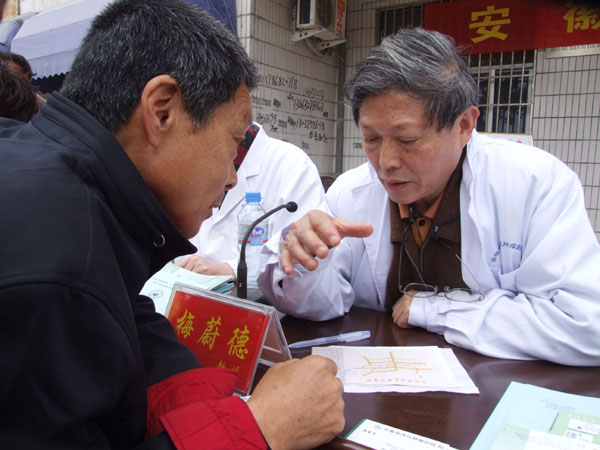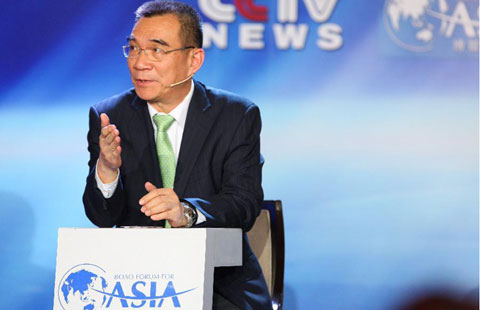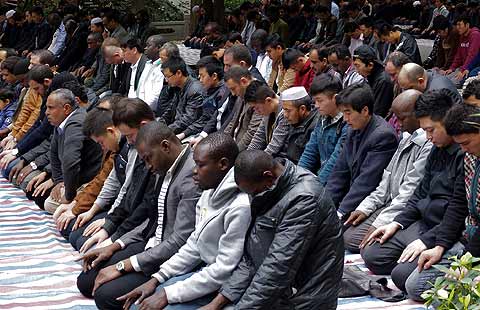Intervention needed to stem rise in cancer
Updated: 2014-04-09 07:39
(China Daily)
|
||||||||
 |
| A man consults a cancer expert in Anhui province in this file photo. [Photo/Asianewsphoto] |
Cancer has been on the rise in China and without timely intervention will become a major public health challenge, senior cancer experts warned.
According to the 2013 Cancer Registry Annual Report, 3.09 million Chinese developed cancer and 1.96 million died in 2010.
The estimates were based on data from 145 cancer surveillance sites in 24 provinces covering 158 million people and are highly reliable, said Chen Wanqing, director of the National Central Cancer Registry under the National Health and Family Planning Commission.
He said the effects of cancer intervention are usually seen in 15 to 20 years, and "it is urgent for the government to introduce more forceful and comprehensive campaigns to rein in the rising trend of cancer".
The threat has been recognized internationally.
In February, the World Health Organization issued a World Cancer Report that said developing countries in Asia, Africa, and South and Central America are among the hardest hit by cancer.
China accounted for 21.8 percent of the new cases worldwide in 2012, and for nearly 27 percent of the cancer deaths, about 8.2 million, it estimated.
In 2010, the incidence rate of cancer stood at 235 out of 100,000 among Chinese, with males and urbanites hit harder than females and rural residents, the latest Chinese report said.
Denmark, France, Australia, Belgium and Norway recorded the highest cancer incidence, according to the WHO report.
China reported 148.8 cancer deaths per 100,000 in 2010. Countries registering higher rates include Mongolia, Hungary, Serbia and Uruguay.
The most common types of cancer in China are lung, breast, gastric, liver, esophageal, colorectal and cervical cancer, it said.
Lung cancer alone killed 490,000 Chinese in 2010, the report said.
"China is facing an increasing cancer burden and prevention and control should be increased at once," said Shi Yuankai, vice-president of the Chinese Academy of Medical Sciences Cancer Hospital.
According to Shi, risk factors for cancer include smoking, obesity, a sedentary lifestyle, an unhealthy diet and pollution.
But he said so far a direct link between a rising lung cancer rate and smog couldn't be scientifically substantiated.
Moreover, the aging trend in China is expected to bring a heavier cancer burden, said Chen Wanqing.
The cancer incidence among Chinese aged 40 and older has begun to increase and peaked among those reaching 80 years old, according to the report.
Worldwide, the global cancer burden is still on the rise, but "there are exceptions, like in the United States and some European countries, where the cancer epidemic has begun to dwindle," Chen said.
He attributed it to huge progress in cancer research funding and enhanced treatment and screening efforts in the country.
"It's high time for China to wage such a forceful and comprehensive war against cancer. Otherwise, it will be too late," he said.
shanjuan@chinadaily.com.cn
|
 |
 |
- G20 to focus on boosting global growth, not Crimea -official
- Candlelight prayers offered for missing 239
- UN group puts New Zealand human rights image in doubt
- 2 pilots killed as army plane crashes in Pakistan
- US, Japan, S.Korea resolute on 'verifiable denuclearization' of Korean Peninsula
- Getty Museum to return stolen Bible manuscript

 Chinese schools vie in moot court
Chinese schools vie in moot court
 Australian divers start underwater search for MH370
Australian divers start underwater search for MH370
 Cleaver-wielding man subdued after tense standoff
Cleaver-wielding man subdued after tense standoff
 Pro-Russian demonstrators announce Kharkov's independence
Pro-Russian demonstrators announce Kharkov's independence
 Breakdancer 'freezes' in front of Paris landmarks
Breakdancer 'freezes' in front of Paris landmarks
 TV Debate in Boao Forum for Asia Annual Conference
TV Debate in Boao Forum for Asia Annual Conference
 Ming Dynasty 'chicken cup' sells for record $36 million
Ming Dynasty 'chicken cup' sells for record $36 million
 Simply child's play
Simply child's play
Most Viewed
Editor's Picks

|

|

|

|

|

|
Today's Top News
China urges US to restrain Japan
Moscow warns Kiev of 'civil war'
Zillow offers US real estate listings
The tough battle with the army of American lobbyists
Growth decline no cause for alarm, forum told
Urbanization called major 'tectonic' event by expert
Troubled Mideast peace effort compounds US policy woes
Report identifies sources of mass protests
US Weekly

|

|







